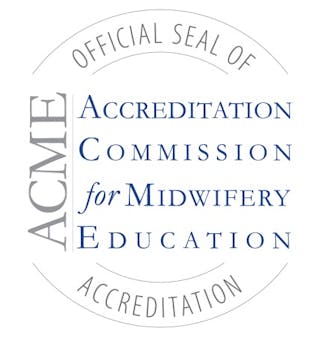Frequently Asked Questions
M.S. in Nurse-Midwifery
If you have questions about advancing your nursing career and becoming a nurse-midwife, you’re not alone. Learn the answers to some of the most frequently asked questions about pursuing a career in nurse-midwifery—and don't hesitate to connect with our enrollment team to hear more about nurse-midwifery at Bethel.
What are the different types of midwives?
There are three different types of certification for midwives in the United States:
Certified nurse-midwife (CNM)
Certified nurse-midwives are registered nurses who have earned a graduate-level midwifery degree. They are certified by the American Midwifery Certification Board and can provide primary care,
including gynecological and maternity care, to women throughout the lifespan. They attend births in home, birth center, and hospital settings. They are licensed in all US states.
Certified midwife (CM)
Certified midwives are similar to certified nurse-midwives, but their bachelor’s degree is in a non-nursing field prior to earning a graduate-level midwifery degree. Like certified nurse-midwives, they
are certified by the American Midwifery Certification Board and can provide primary care, including gynecological and maternity care, to women throughout the lifespan. They attend births in home, birth center, and hospital settings. Not all states license certified midwives.
Certified professional midwife (CPM)
Certified professional midwives are certified by the North American Registry of Midwives. They may or may not have received a graduate degree in midwifery. Their expertise is in providing maternity care to essentially healthy women in home and birth center settings. Not all states license certified professional midwives.
What can you do with a master's in midwifery?
With a Master of Science in Nurse-Midwifery, you’ll be prepared to provide primary healthcare, including gynecological and maternity care, to women throughout the lifespan. Nurse-midwives go on to work in hospitals, clinics, private practices, birth centers, and more.
Are midwives in high demand?
Jobs for nurse-midwives are projected to grow by 7% over the next 10 years, according to the Bureau of Labor Statistics, which is faster than average. Nurse-midwives are considered advanced practice registered nurses (APRNs), and they are able to offer many of the same services as physicians. APRNs are becoming more widely recognized as sources for primary healthcare and are being used increasingly in team-based models of care.
Is being a certified nurse-midwife worth it?
As a certified nurse-midwife, you’ll advance your nursing career by specializing in a highly rewarding field. You’ll provide a service that improves the overall health of women, mothers, and babies. You’ll also increase your earning potential; according to the Bureau of Labor Statistics, the median salary for nurse-midwives in 2023 was $129,650 while the median salary for registered nurses was $86,070

The master's degree program in nursing at Bethel University is accredited by the Commission on Collegiate Nursing Education (www.ccneaccreditation.org) and the Accreditation Commission for Midwifery Education (www.midwife.org/acme). Find out whether this program meets the licensure requirements for your state here.